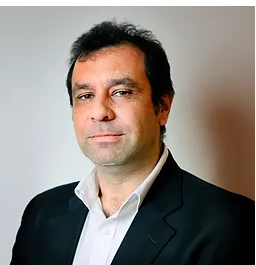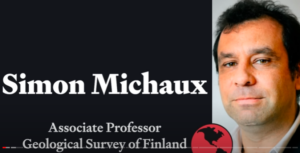Renewables cannot power the world we know. Dr. Simon Michaux from the Geological Survey of Finland crunched the numbers: not enough time, and not enough metals. In this unique interview on Rachel Donald’s PlanetCritical broadcast, Michaux explains the limits – and what we CAN do in a sustainable society.
Edited for radio by Maria Gilardin of TUC Radio and Alex Smith of Radio Ecoshock.
Listen to or download this Radio Ecoshock show in CD Quality (57 MB) or Lo-Fi (14 MB)
Maria Gilardin writes:
“When I found this conversation and decided to re-broadcast I was intrigued by Simon Michaux’s rare expertise in mining – and by the premise that we can’t go green without going small. Our fossil fueled economy is destabilizing the planet. But a renewable economy as it is designed now makes unsustainable demands on minerals and materials of the earth.
Simon Michaux is an associate professor at the Geological Survey of Finland. He is a problem solver in the mining industry and now the industrial recycling industry. Most of his current scientific papers deal with the tasks to completely phase out fossil fuels in Finland.”
Go to PlanetCritical.com to learn more and subscribe.
FINDING SIMON MICHAUX

CONNECTING WITH WORK OF RACHEL DONALD
X/Twitter: Rachel Donald
@CrisisReports
Investigating why the world is in crisis—and what to do about it • creator
@PlanetCritical_
https://twitter.com/PlanetCritical_
Bluesky
@racheldonald.bsky.social
Rachel’s web site at planetcritical.com is a substack which asks you to sign in, but does not require it. You can click “No Thanks” and go on toe Rachels latest program. You also have the option of just listening, as a podcast, on her site.
Be sure to check out this new show:
Climate Corruption | Amy Westervelt
And why revolution may be the only answer to corporate capture
Or you can go straight to over to her 170 videos on YouTube here. Rachel has some great guests and essential topics. Check it out.
WATCH THE FULL SIMON MICHAUX INTERVIEW ON YOUTUBE
You can watch the 90 minute film of this Simon Michaux interview on YouTube under the title: The Unsustainable Green Transition. It has over 100,000 views.
DATE: April 19, 2023
Rachel Donald describes the YouTube video/podcast:
“Our fossil-fueled economy is destabilizing the planet. But a renewable economy might not be much better. Simon Michaux and his team at the Geological Survey of Finland have been researching how much minerals and materials we have on earth to build our renewable energy. They’ve found that we simply do not have enough – and mining for those materials would bears a huge environmental cost.
On this episode, Simon walks us through the research, the possible outcomes from calculated energy contraction to collapse, what policymakers are doing with this information, and how the geopolitics of the US-China proxy war could make the green transition impossible for the West.”
This conversation between Rachel Donald of PlanetCritical with Dr. Simon Michaux was edited down to one hour for radio by Maria Gilardin of TUC radio (first half hour) and Alex Smith of Radio Ecoshock (second half hour). My thanks to Maria and Rachel for making this essential information available. Find Maria’s “Time of Useful Consciousness – TUC Radio” at https://tucradio.org/. You can support Rachel’s work in independent climate journalism on Patreon.
My notes on the Simon Michaux interview are posted below. Thank you for listening and caring about our world.
We close the show with a Shane Philip song: “I Want to See You In the Sun”. Check out Canadian one-man band green artist Shane Philip here on Facebook. He plays many instruments including the Australian didgeridoo.

===================
NOTES FROM SECOND HALF HOUR: Simon MIchaux with Rachel Donald
What We Can/Must Do

Graphic courtesy of Rachel Donald, Planetcritical
Audio edited by Alex Smith. I do not have notes for the important first half hour where major barriers to greening the current economy are presented. But here we go with the second half hour.
PROBLEM A: ENERGY STORAGE FOR WINTER
Michaux calculates our current civilization needs 2,000 Terrawatt hours of storage to get through the 28 lowest days of winter in Northern Hemisphere. That is about 10% of total electricity generated in 2018.
Sustainable options for green energy storage include pumping water up to reservoirs when excess is available, and regenerating electricity with hydro turbines as the water descends again. Other possibilities include in-ground compressed air storage and spinning flywheels.
For the very short term, like minutes, there is “super-capacity”. This can help balance power capacity within a millionth of a second, often necessary for grid operation.
A study by the Singapore government found batteries the best form of overall storage. It can fit anywhere. But Michaux says the severely underestimate the amount of battery power they would require just for Singapore. We don’t have technology to do that, especially storing a lot of power for as long as 11 months.
Wind power is especially challenging. A wind storm may generate a lot of energy (which needs storage) for a couple of days, and then go still, producing no power, for a few days. The peaks and troughs of production are pronounced. Probably no one knows how big a buffer is required for wind power.
BATTERY TECH AND MINERALS
Simon lists several combinations of minerals (some rare) and chemicals required for different battery technology. There is more than just the well-known lithium ion batteries.
The IEA [International Energy Agency] released a report with their vision of what the renewable grid would look like in 2040 or 2050. Michaux crunched the numbers for that.
Elon Must said in a recent podcast he can make batteries without lithium. They still do need nickel, manganese and cobalt – minerals already in a shortage state. Batteries can be made out of sodium or zinc – even the fluoride. But government agencies are in a group-think acceptance of lithium-ion batteries now.
Michaux covers battery recycling options, once their lifetime has passed. Most mobile phones have not been collected for recycling. 95% are in a drawer somewhere. the collection system if the problem. Apple built a robot to take apart their phones and recapture some raw earths. But they are not collecting all the old phones yet.
A BETTER ANSWER – VARIABLE POWER SYSTEMS – THE INTERMITTENT GRID
Instead of shooting for so much storage the Earth is wrecked for materials and then wrecked again with electronic waste – build a grid and electric goods that can withstand and use variable power, Michaux says.
I have been saying this for years. When the sun shines or the wind blows factories are open and operate 24/7. When power is low, those are vacation times for workers, the factory runs on low production or temporarily shuts down. Citizens and society are re-arranged to live with natural power as it comes. You may travel to relatives when there is enough wind or sun to do it. Forget 9 to 5 on fixed week days. Make hay when the sun shines. Be flexible, the whole society needs to be energy flexible. Live with variable power instead of everything you want any time you want it.
(Many developing countries already live with a few hours of electricity a day…there are daily rolling blackouts.)
THE BIG SHRINK
Michaux says a 19 Gigawatt society needs to shrink to a 5 Gigawatt society to be sustainable. We have a long way to go. About 1 percent of all vehicles are electric, and renewables presently provide about 5 percent of global energy used. We’ve done nothing about it for the last 40 years.
In the longer interview posted by Donald, Michaux thinks by the end of this year we could be in a kinetic shooting war East versus West. Yet we depend on Chinese production. They make the electric vehicles and do the mining. If there is a war, electric cars would not be on the market. There are limits to capacity to make what we need, and war or conflict might limit what we can get further.
THE CASE OF UK MINING
The United Kingdom used to have a mining industry. Now it outsources all mining needs to other countries, Michaux says it would take ten to twenty years just to reestablish a mining industry in the UK. During that time, necessary minerals for batteries, turbines and panels man not be available – if overseas markets cannot or will not provide those minerals. Mineral self-sufficiency takes years to decades and massive investments, not to mention social acceptance of further ecological damage, pollution of air, water, and land with toxic materials like heavy metals. Remember many tons of waste result in just a small amount of the mineral, especially since the best most easily accessed places are already mined out. It gets harder and more costly over time.
The UK and most of the West also closed their metal smelters, leaving most to the Chinese. Hardly any steel is produced in the West.
Michaux is looking into a plan for Finland and all Nordic countries to produce green energy tech at home. They look for a circular economy, possibly in alliance with the UK, which has the manufacturing capacity. Minerals would be mined in Scandinavia, with manufacturing in UK.
A NEW MODEL: THE RESOURCE BALANCED ECONOMY
Michaux is working on a new model of model the Resource Balanced Economy. The Swedish government requested this study: we are about to lose fossil fuels, but don’t have enough energy to transition. What do we do? The study is part of a circular economy group of the Geological Survey.
Simon gives the example of working in agriculture, trying to solve a fungus problem. The fungicide trees were barely alive, but those with better fertilizer beat the fungus and thrived.
At one time Michaux lived in Brisbane Australia. In an emergency, like a flood, all normal activities are stopped until aid is given and all are safe. We need a similar willingness to change patterns in the climate/energy emergency.
To begin with, we are surrounded by useful stuff that needs to be repurposed. For example we need to strip all the useful stuff out of scrapped cars. Ditto electronics. Recycling will become more prominent, but re-purposing comes first.
The transit sector is the hardest to solve, being so dependent on fossil fuels. We need to go to communal transport like trucks and buses.
To adapt to z reality we can survive, we need to become a low energy society. This includes getting off fossil-based chemical fertilizers and agrochemicals. Massive amounts of the most precious soil is becoming sterilized by chemical use. The organic life is dying off, making the crop entirely dependent on fossil fuel inputs. Michaux says about 40% of arable land has been degraded since 1960. All this will make the true sustainable transition even harder.
FOUR PARADIGMS FOR THE FUTURE
Michaux has developed 4 basic paradigms or shapes of the future.
The first is the Cornucopians who say we will always find ways to fill our needs. Stop worrying.
The second he calls “the Vikings”. Realizing shortages and hard times come, they decide to just take what they need from others – instead of the work of making new systems. These are the pirates or raiders. Eventually they run out of the fuel needed or other materials for predation.
The third group are the prepper community. They know normal systems could/will break down. They may grow their own food, manage their own water supply, generate their own power or do without.
The fourth are “the Arcadians”. They look 100 years into the future. How can we live properly and sustainability. Like the Venus Project but integrate that into the Prepper community that recognizes commodity shortfalls.
There you go friends. Which future will it be?
Alex
Didn’t find him very convincing yethey are lots of problems with energy return but I but I think he was exaggerating someone else stuff
He’s saying again what we knew 20 years ago (I should say scientists knew) and ignored. The thought of a sane society – !!!